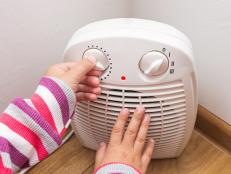How to Get Your Kids to Do Chores
11 tips for making chores stick.

11 Ways to Make Chores a Priority
Sometimes, getting kids to do their chores can be a bit of a chore in itself. It can be difficult to get your children on board with doing laundry, putting away their toys, washing dishes, and completing other household tasks. Luckily, we have some expert tips and advice to help you along the way.
Know Your "Why"
Before you implement a chore regimen for your family, it might be helpful to establish your reasons for doing so first. One of the main reasons for starting a chore routine is that it benefits your children. Chores teach kids life skills about the importance of working hard to complete a job and keeping tidy and organized, according to Lizzie Assa, MsED, the founder and creator of the Workspace for Children. She added that helping around the house builds their confidence, fosters a sense of independence and perseverance, and creates a deeper sense of belonging to a family.
Kids Aren’t the Only Ones Who Benefit from Chores
"The benefit of having kids help around the house with chores is that they have a happier, more connected parent," Assa noted. When your child wants your undivided attention, it can be overwhelming to give it when there are dirty dishes in the sink, laundry piled in baskets, unmade beds, and rooms strewn with toys. But getting some help with these household chores will free up time and frustration, allowing you to relate and play with your children in a less distracted way.
You Can Start ’Em Young
You can start teaching kids to tidy around the house earlier than you might imagine. "You can even show your sitting-up baby how to put things in a basket and take them out," Assa said. "That’s a developmental skill, but it’s also a life skill." By the time they’re toddlers, they can do "jobs" like throwing their diapers into the bin, tossing their clothes into the hamper, and putting away their toys and books. But don’t worry if your kids are older: It’s never too late to start teaching kids how to help around the house.
Remember to Choose Developmentally Appropriate Chores
Assa recommends that parents choose developmentally appropriate chores for their children. For instance, in the toddler stage, children tend toward egocentrism. They’ll be more interested in doing chores that matter to them, such as lining up their trucks on a shelf or throwing away their diapers. On the other hand, preschoolers, who are starting to learn their letters, might enjoy making place cards at the dinner table with the first initials of their family members' names. According to Assa, "That's going to give them a real sense of pride, and it’s something that they want to do."
Teach Grade-Schoolers Why Their Chores Matter
Grade-schoolers can carry their dirty laundry to the laundry room, put clean laundry away in drawers, sweep, vacuum, and wipe down countertops with a good, natural cleaning product — but they’ll want to know that they’re doing a good job and making an impact. "When you tell your kids they’re really good at vacuuming, and you’ve taught them how to do a job well, they get inner satisfaction from that — and that carries over to more than just vacuuming," Assa said.
Give Clear Expectations to Older Children
By the time kids reach middle school and high school, they’re capable of doing all of the chores that you can, except that they might not want to do them. To avoid a nagging cycle, Assa recommends giving clear directions about what you expect from each of your older children. For example, at the start of the day, write out a list of chores you expect each child to finish by a certain time. "That way, they know the expectations and it’s not me nagging them," Assa explained.
Teach Kids How to Do a Good Job
At the outset of starting a new chore system, you should plan to invest some time and effort to teach your children how to do the chores properly. If you’ve tasked them with a particular chore and you’re redoing it behind them, it defeats the purpose. Plus, it feels discouraging. "If you give your preschooler a broom and a dustpan, and they just kind of swish it around and you say 'good job,' and then they see you five minutes later sweeping the kitchen properly, that doesn’t feel good to them and it doesn’t feel authentic," emphasized Assa.
Find a Good System to Keep You Accountable
Whether it’s a chore chart from Etsy or an app on your phone, finding a good system will go a long way to helping you stick with a chore plan. You can also just use a plain old piece of paper and a marker. Tape a list of chores for each child to the fridge with a marker that your kids can use to cross them out when they’re through.
Build Chores Into Your Routine
Look at your family’s schedule and figure out when you can add chores to the routine. For Assa, this has changed over time. When her kids were younger, she suggested that they get a jump on their chore charts early in the morning before leaving for school. "My kids used to be early risers, so instead of resenting it, I’d work with it," Assa said. On the other hand, older kids who have early starts at school might do better with chore routines that take place in the evenings or on the weekends.
Be Specific in Your Praise
Rather than just telling your children "good job" on their chores, be specific about how impactful their chores are. According to Assa, you could say something like this to your child: "You made the beds and fed the dog, so now you have an extra 30 minutes at the park because I don’t have to do it." You can also talk about how an individual child’s chores benefit his or her siblings. "Little kids love that, they love feeling part of a team, and they love to feel impact," Assa said.
You Can Always Start Over
You’ve started the school year with the best intentions. You’ve created a list of age-appropriate chores for your children, and you’ve taught them how to do them. You even have a tool that will help you stay committed — but then a kid gets sick or has a heavy homework night. Or maybe everyone snoozes past the alarm and you’re running late for school (again). No matter what happens to derail your chore plan, you can always start over. "Instead of beating yourself up over it, just be honest with your kids and say, 'let’s start again,'" Assa stated.
YOU MIGHT ALSO LIKE: Study Finds Married Women Do More Housework Than Single Moms, Could Your Parenting Style Determine Your Child's Financial Success?, Girls May Be Struggling More Throughout the Pandemic





















